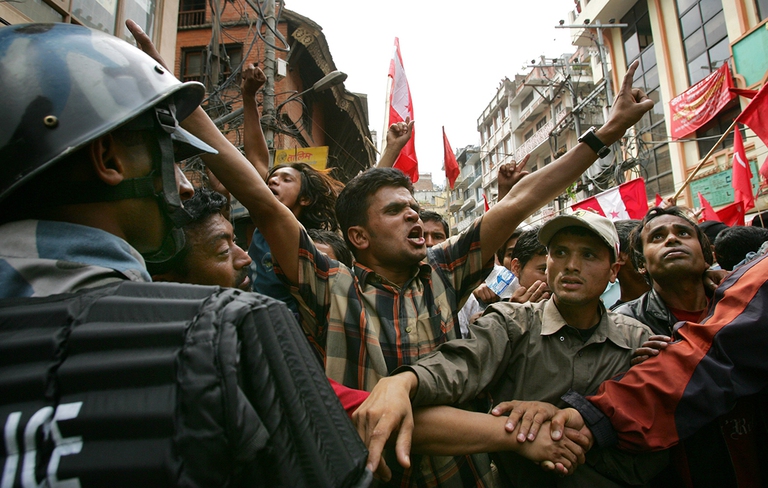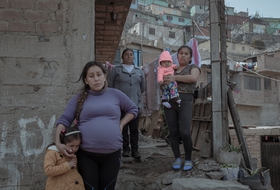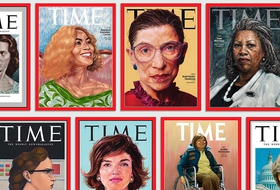
One in three women have suffered physical or sexual violence. With contributions from Europe, Africa, Asia and Latin America, we look at how this shadow pandemic affects every corner of the world.
Nepal has elected, on 28 October, its second president since it became a democratic republic in 2008. For the first time the president is a woman. Bidhya Devi Bhandari, 54, of the Unified Communist Party of Nepal, has been elected thanks to the vote of 327 members of Parliament against 214. As in other countries, the
Nepal has elected, on 28 October, its second president since it became a democratic republic in 2008. For the first time the president is a woman. Bidhya Devi Bhandari, 54, of the Unified Communist Party of Nepal, has been elected thanks to the vote of 327 members of Parliament against 214. As in other countries, the presidential role is more importantly symbolic, considering that the political power is held by the Prime Minister, the comrade and party leader Khadga Prasad Oli. Bhandari succeeds Ram Baran Yadav, the first president of Nepal that has been elected in 2008 after the decision of the Parliament to abandon the monarchy.
Bhandari is not new to politics. Since the 1980s she has been campaigning for gender equality in politics, contributing to secure women’s right under the new constitution and to achieve that one-third of the members of parliament have to be women and either the president or vice-president must be a woman. Nevertheless, many criticisms arose due to her position on citizenship. The constitution – supported by the newly elected president – makes it difficult for a single mother to pass her citizenship to her child. A child of a Nepali woman and a foreign man cannot get a citizenship by descent unless the man first takes Nepali citizenship; but children can become Nepali automatically if the father is Nepali, regardless of the mother’s nationality.
After a pause from the political stage, due to the commitment of her husband Madan Bhandari, one of the most charismatic politicians Nepal has had, and her choice to take on family responsibilities, Bidhya Devi Bhandari decided to go back to politics in 1993, after her husband was killed in a mysterious car accident. One of her next tasks will be lifting the country out of the instability also due to the adoption, in September, of the new constitution. Ethnical minorities in Nepal, indeed, do not think to be properly represented compared to Hindu majority, and ask more rights. To date, 40 people died in clashes with the police.
Siamo anche su WhatsApp. Segui il canale ufficiale LifeGate per restare aggiornata, aggiornato sulle ultime notizie e sulle nostre attività.
![]()
Quest'opera è distribuita con Licenza Creative Commons Attribuzione - Non commerciale - Non opere derivate 4.0 Internazionale.
One in three women have suffered physical or sexual violence. With contributions from Europe, Africa, Asia and Latin America, we look at how this shadow pandemic affects every corner of the world.
The Istanbul Convention against gender-based and domestic violence marks its tenth anniversary. We look at what it is, who its signatories are, and what the future might hold.
European Commission President Ursula von der Leyen reminded us of the gravity of violence against women around the world, and of the Istanbul Convention’s utmost importance.
President Erdoğan has pulled Turkey out of the Istanbul Convention, key in the fight against gender violence, claiming that it favours the LGBT community rather than family values.
Violence against women in Peru has increased as a result of Covid-19 lockdowns. 14,912 people were reported missing from January to November 2020, more than half of them minors and 64 per cent women. People have been confined to their homes for months, many forced to endure poor physical, economic and social conditions. A situation that
Joys Estefani Qqueccaño Huamani, 24, disappeared from her rural community in Peru on 9 October. Her family began looking for her independently of the authorities and despite the resistance of relatives of Joys Estefani’s ex-partner Arturo Ccana Condori, 32, charged with committing violence against her on 28 September, eleven days before Joys Estefani disappeared. Photos
Costa Rica celebrated its first same-sex marriage when two women, Alexandra Quiros and Dunia Araya, celebrated their wedding: an “extraordinary moment”.
The pandemic and its restrictions are affecting everyone, without exceptions. However factors like housing, income inequalities, gender, access to technology and working conditions are influencing how people experience the health crisis.
Time magazine’s 100 Women of the Year project sheds light on influential women’s stories, from Amelia Earhart to Greta Thunberg. A selection of some of the greats for International Women’s Day.








